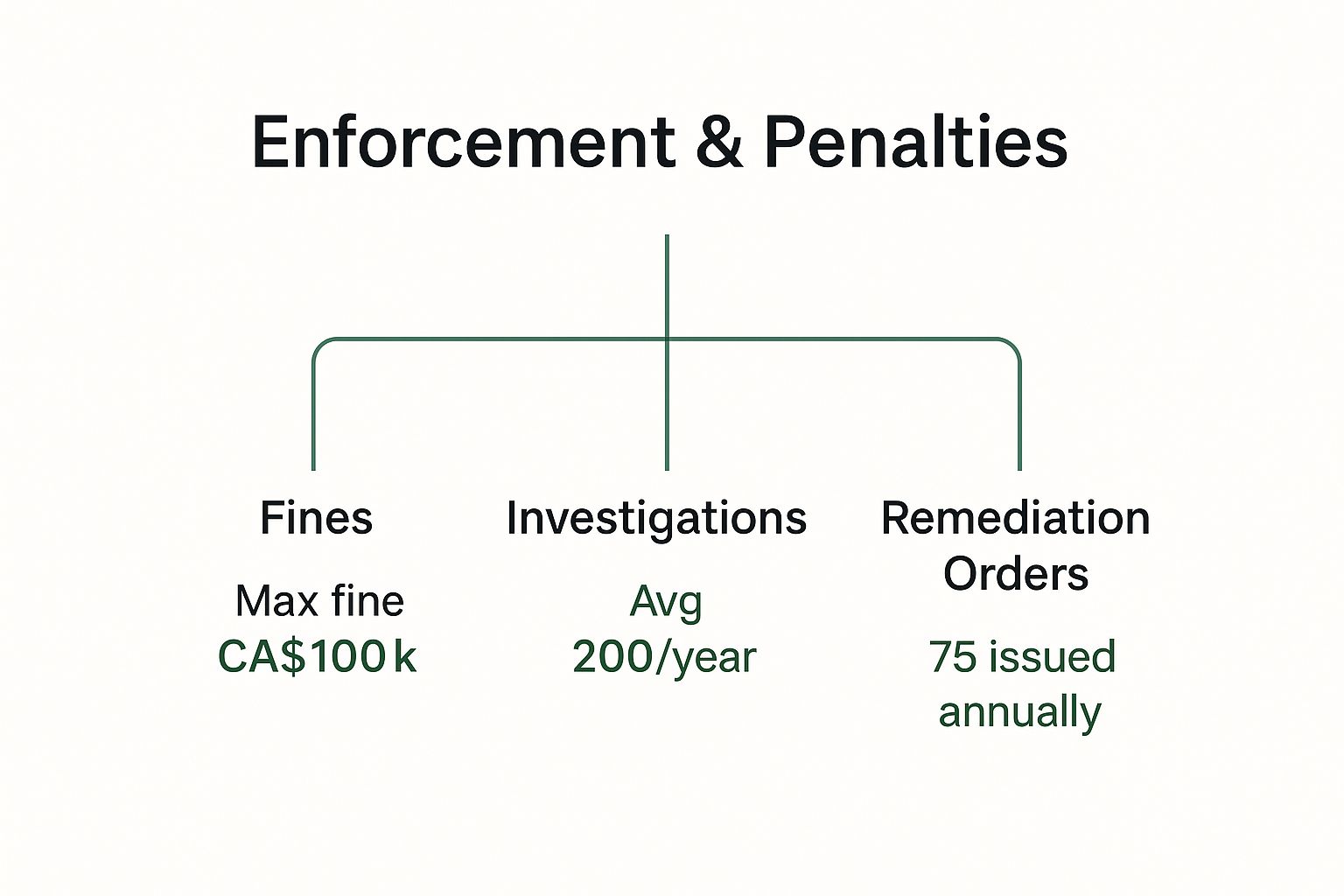Canadian Data Privacy Laws Explained

Trying to get your head around Canadian data privacy laws can feel like you’ve been handed a puzzle with pieces from different boxes. It’s not just one single rulebook. Instead, Canada uses a "patchwork" system, blending a primary federal law with several robust provincial ones. The main player on the federal stage is the Personal Information Protection and Electronic Documents Act (PIPEDA), but it doesn't operate in a vacuum—it works hand-in-hand with powerful local laws in key provinces.
How Canada's Privacy Law Framework Actually Works

The best way to understand Canadian data privacy is to see it as a set of interconnected regulations rather than a single, monolithic law. Think of it like this: PIPEDA is the national building code. It sets the minimum safety and quality standards that apply everywhere in the country. But, certain provinces—like Quebec, British Columbia, and Alberta—have decided to build their own, often stricter, local versions of that code.
This means you can't just create one compliance strategy and apply it across the board if you do business nationwide. The rules you follow for a customer in Ontario might not cut it for one in Quebec. Getting a grip on this layered approach is the first and most crucial step to staying compliant in Canada.
The Federal vs. Provincial Split
At the heart of it all is PIPEDA. This federal law dictates how private-sector businesses can collect, use, and share personal information as part of their commercial activities. It’s the baseline for the whole country.
However, the federal government has recognized that some provinces have their own privacy laws that are "substantially similar" to PIPEDA. In those cases, the provincial law takes over for business conducted within that province's borders.
The big three provincial laws you need to know are:
- Quebec: Law 25 (officially, An Act to modernize legislative provisions as regards the protection of personal information)
- British Columbia: Personal Information Protection Act (BC PIPA)
- Alberta: Personal Information Protection Act (Alberta PIPA)
If your operations touch these provinces, their rules are the ones you need to follow. For every other province and territory, PIPEDA is the go-to law for private businesses.
At its core, this system ensures a foundational level of privacy protection nationwide while allowing provinces to innovate and implement stronger safeguards tailored to their populations. This is why knowing the difference between federal and provincial rules is the critical first step toward compliance.
To help clarify this structure, here's a quick look at the major laws governing business in Canada.
Canada's Major Privacy Laws at a Glance
| Legislation | Jurisdiction | Applies To | Key Feature |
|---|---|---|---|
| PIPEDA | Federal | Private-sector organizations across Canada | Sets the national standard for consent-based data collection and use. |
| Quebec Law 25 | Quebec | Private-sector organizations handling data of Quebec residents | Introduces some of the strictest rules in North America, similar to GDPR. |
| BC PIPA | British Columbia | Private-sector organizations within British Columbia | Deemed "substantially similar" to PIPEDA, with its own provincial oversight. |
| Alberta PIPA | Alberta | Private-sector organizations within Alberta | Another "substantially similar" law with specific rules for the province. |
This table shows how the "patchwork" comes together, with a federal baseline and specific provincial laws taking precedence where they apply.
This unique structure creates real-world challenges. Imagine you run an e-commerce store from Toronto. For a sale to someone in Manitoba, you follow PIPEDA. But for a sale to a customer in Montreal, you must meet the much tougher requirements of Quebec's Law 25. Ignoring these differences is a recipe for compliance gaps and hefty fines. The bottom line is simple: your company's footprint determines which rules apply.
The Story Behind Canada's Privacy Rights
If you want to get a real handle on Canada’s web of data privacy laws, you have to look at how we got here. The idea of privacy wasn't born with the internet. It’s been a slow burn, evolving over decades from a big-picture human rights concept into the specific, nitty-gritty data rules businesses grapple with today.
Think of this as more than a history lesson. It’s the "why" behind every regulation. When you understand the journey, the logic behind the laws starts to click, and compliance becomes much clearer.
From Human Rights to Data Rights
Canada's focus on privacy started long before anyone was worried about their online shopping history. The first real push was about protecting our basic dignity and freedom from an overreaching government or powerful institutions. These early ideas were less about data and more about personal space, woven into our legal and ethical fabric.
The formal legal story kicked off in the latter half of the 20th century. The first major milestone was the Canadian Human Rights Act of 1977, which laid down some foundational principles for data protection that still echo in our laws today. But as technology raced forward, it became obvious that these broad ideas needed to be sharpened to deal with the realities of the private sector and the digital world.
Key Takeaway: Canadian data privacy isn't just a tech issue. It’s built on a bedrock of fundamental human rights, which has been carefully updated over time to meet the challenges of our data-driven lives.
The Provinces Step Up
With the federal government setting the tone, the provinces started creating their own privacy rules. Places like British Columbia, Saskatchewan, Manitoba, and Newfoundland and Labrador all passed laws that gave people the right to sue for privacy violations, though you often had to prove the breach was deliberate. Quebec went even further, baking privacy protections right into its Civil Code, a move that set a powerful precedent.
These early provincial laws were the building blocks for the more complex regulations we have now. They established a pattern of regional control, with each province putting its own spin on things. This is how we ended up with the "patchwork quilt" of privacy laws that businesses have to navigate across Canada.
The Game-Changer in the Courts
Then, in 2012, everything shifted. The Ontario Court of Appeal delivered a landmark ruling in a case called Jones v. Tsige. For the first time, the court officially recognized a new civil wrong, or "tort," called "intrusion upon seclusion."
This was a massive deal. It meant you could now sue someone for intentionally prying into your private affairs, even if you didn't lose any money. Suddenly, people had a powerful new legal tool to protect their information, opening the floodgates for privacy breach lawsuits across common-law Canada.
This court decision, combined with the growing body of privacy laws, created the dynamic legal environment we're in today. You can explore the history of these developments to see how our laws and court rulings have intertwined over the years, constantly adapting to keep up with both technology and what we, as a society, expect when it comes to our privacy.
Understanding PIPEDA: The Federal Standard

Think of the Personal Information Protection and Electronic Documents Act (PIPEDA) as the baseline for privacy across Canada. It's the federal government's rulebook that dictates how private-sector businesses must handle personal data during any commercial activity. That covers everything from a customer placing an online order to someone signing up for your loyalty program.
While some provinces, like Quebec, have their own powerful privacy laws, PIPEDA acts as the default standard for the rest. It’s built on a pretty straightforward idea: people have a right to know what's happening with their information, and businesses have a duty to protect it.
To make that idea a reality, PIPEDA is built around 10 Fair Information Principles. These aren't just suggestions; they're the core of the law and should be the pillars of your data handling practices.
The 10 Fair Information Principles Explained
These principles are the DNA of federal Canadian data privacy law. They provide a clear roadmap for how you should collect, use, and share personal information, all while keeping things transparent and respectful for your customers.
Let's break them down.
- Accountability: Your company is on the hook for all the personal information it controls. You need to name a point person—usually called a Privacy Officer—who is responsible for making sure you’re following the rules.
- Identifying Purposes: Before you even think about collecting data, you must be crystal clear about why you need it. This purpose needs to be documented and explained to the person before or at the moment you collect their info.
- Consent: This is the big one. You need to get someone’s knowledgeable permission to collect, use, or share their personal details. A classic example is a customer actively ticking a box to get your newsletter—that's clear consent.
- Limiting Collection: Don't get greedy with data. You should only collect what is absolutely necessary for the purpose you've already identified. If you only need an email to send a digital receipt, asking for a home address is probably crossing a line.
- Limiting Use, Disclosure, and Retention: Once you have the data, you can only use it for the reason you collected it, unless the person says it’s okay to do otherwise or the law requires it. And when you don't need it anymore? You have to either destroy it securely or make it anonymous.
Key Insight: These first five principles are all about setting the stage. They force you to be deliberate and upfront about the who, what, and why of your data collection, building a foundation of responsibility from the get-go.
Getting these principles right is half the battle. The other half is knowing where your data physically lives. The idea of data sovereignty—keeping data within a country's legal borders—is a growing concern for many businesses.
Safeguarding and Access Rights
The final five principles kick in after you’ve collected the data. They’re all about security, keeping information accurate, and respecting a person's right to access their own file. These are just as crucial for building trust and staying compliant.
- Accuracy: Personal data has to be as accurate, complete, and up-to-date as needed for the job it's doing.
- Safeguards: You're required to protect personal information with security measures that match its sensitivity. Sensitive financial or health data obviously needs much stronger locks and keys than a customer's name.
- Openness: You can't be secretive about your privacy practices. Your privacy policy needs to be easy to find and written in plain English that anyone can understand.
- Individual Access: If a customer asks, you must tell them what personal information you have on them, what you're using it for, and who you've shared it with. They also have the right to challenge its accuracy and ask for corrections.
- Challenging Compliance: People need a clear path to raise concerns. They should be able to challenge your company's compliance by contacting your designated Privacy Officer.
By weaving these ten principles into the fabric of your business, you stop just reacting to privacy rules and start proactively building a company people can trust.
Navigating Provincial Privacy Regulations
While federal law sets the stage, the real action in Canadian data privacy laws happens at the provincial level. This is where you see the "patchwork" system everyone talks about. Several key provinces have rolled out their own regulations, and they're often more modern and demanding than the federal baseline. Overlooking these local rules is a huge compliance miss.
If your business operates across Canada, you can't afford to see the country as one uniform market. The privacy rights of a customer in British Columbia are different from one in Alberta, but the biggest game-changer right now is coming out of Quebec.
Quebec’s Law 25: The New Bar for Privacy
Quebec's Law 25 isn't just another provincial statute; it’s a total overhaul of privacy rights, bringing the province much closer to the strict standards of Europe's GDPR. For businesses, this means stepping up your game, especially around how you get consent and handle personal information.
The law has been rolling out in stages, with each phase adding new teeth. A major milestone hit on September 22, 2023, strengthening the core pillars of accountability, consent, and transparency. It's a clear evolution from older laws like PIPEDA. The next big date is September 22, 2024, which will introduce the right to data portability—a massive win for consumer control. You can dig into the full legislative story to see how these changes affect day-to-day operations.
So, what does Law 25 actually require?
- Ironclad Consent: Forget about vague, pre-checked boxes. You now need clear, explicit permission for each specific reason you want to use someone's data.
- Radical Transparency: You have to spell out exactly what data you're collecting, why you need it, and who you might share it with. No more hiding behind confusing legal jargon.
- Privacy by Default: Your services must be set to the highest privacy settings right from the start. Users shouldn't have to hunt through menus to protect themselves.
British Columbia and Alberta’s PIPA
While Quebec’s Law 25 is grabbing the headlines, don't forget that British Columbia (BC) and Alberta have their own Personal Information Protection Acts (PIPA). Both are deemed "substantially similar" to the federal PIPEDA, which means they are the law of the land for private companies within those provinces.
But "substantially similar" doesn't mean identical. Each act has its own quirks. For instance, you'll find subtle but critical differences in what they consider reasonable consent or their specific rules for notifying people about a data breach.
The bottom line is this: provincial laws aren’t optional guidelines. They are the binding rules within their borders. A solid privacy strategy has to be nimble enough to handle the unique demands of every jurisdiction you serve, from the major shifts in Quebec to the established frameworks in BC and Alberta.
This chart illustrates some common business activities and the potential consequences of getting it wrong under these provincial laws.

As you can see, failing to comply can result in hefty fines, official investigations, and court-ordered changes to your business practices. Getting a handle on these provincial rules isn't just about dodging penalties—it’s about building trust and showing respect for your customers' data, wherever they call home in Canada.
What to Do When a Data Breach Happens

Let's be honest—a data breach is a nightmare. It’s far more than a technical problem; it’s a critical moment that puts your entire business to the test. How you handle the fallout speaks volumes about your integrity and your commitment to the Canadian data privacy laws that protect your customers. Moving fast, being transparent, and doing the right thing are non-negotiable for minimizing the damage and salvaging trust.
Your immediate priority is to stop the bleeding—contain the breach and figure out what happened. But right alongside that technical response, your legal duties kick in. The first major task is figuring out just how much risk the breach creates for the people whose information was exposed. That assessment will drive every decision you make next.
Assessing the Risk of Harm
Under the federal law, PIPEDA, you’re required to notify people if the breach creates a “real risk of significant harm” (RROSH). This isn’t a gut feeling; it’s a legal standard. “Significant harm” covers a lot of ground, from obvious things like financial loss and identity theft to less tangible damage, like humiliation or harm to a person's reputation.
To figure out if you've crossed that line, you have to weigh two main factors:
- How sensitive was the data? A list of names and emails is one thing. Financial records or medical histories are in a completely different league of sensitivity.
- What’s the chance the data will be misused? Think about the context. Was the data encrypted? Or was it stolen by a group known for identity theft?
And then there's Quebec. The province’s Law 25 uses a tougher standard, requiring you to assess the "risk of serious injury." This language is much closer to what you see in global privacy laws like GDPR, and it sets a higher bar. A breach that might not require notification under PIPEDA could absolutely demand it if Quebec residents are involved.
This isn't a minor detail. The federal standard is "real risk of significant harm," but for your Quebec customers, it's "risk of serious injury." If you try to apply a one-size-fits-all approach here, you're setting yourself up for a compliance failure.
Executing Your Notification Plan
Once you've determined the breach is serious enough to meet the legal threshold, you have to start notifying people. This is a core requirement of Canadian privacy law, not a suggestion. A clear, well-rehearsed plan is your best friend here. Having a prepared data breach response checklist can be a lifesaver, ensuring you don't miss any critical steps in the heat of the moment.
Your notification strategy needs to reach three distinct groups:
- The Office of the Privacy Commissioner (OPC) of Canada: You must report the breach to the federal commissioner as soon as you feasibly can. The OPC has a specific format for these reports, so make sure you follow it.
- Provincial Commissioners: If people in Alberta, British Columbia, or Quebec were affected, you also have a duty to inform the privacy authority in each of those provinces.
- Affected Individuals: You must contact every single person who is at risk. Your notification needs to be crystal clear about what happened, what you're doing about it, and what they can do to protect themselves.
Canada's privacy laws are often called a "patchwork quilt" for a reason. PIPEDA says you must notify "as soon as feasible," but some provinces add their own spin. Quebec's Law 25, which came into effect on September 22, 2022, introduced much stricter compliance rules. On top of that, if you're in a specialized industry like healthcare or finance, you might have to notify in as little as three days.
Of course, the best incident response is to avoid the incident altogether. For proactive strategies, you can check out https://typewire.com/blog/read/2025-07-28/your-guide-to-modern-data-breach-prevention.
Common Questions About Canadian Privacy Laws
As you start to get a handle on Canada's data privacy landscape, you'll naturally run into some very specific, "what-if" type questions. Moving from the big picture to the nitty-gritty of daily operations is where the real work begins.
Let's tackle some of the most common questions we hear from business owners. We'll skip the dense legalese and give you straightforward answers you can actually use.
What Is the Biggest Difference Between PIPEDA and Quebec's Law 25?
Think of it this way: PIPEDA is the solid, reliable family sedan that gets you where you need to go. Quebec's Law 25 is a high-performance sports car—it's faster, more powerful, and built with the latest technology to meet global standards like GDPR.
The key upgrades in Law 25 are what really set it apart:
- Tougher Consent Rules: Law 25 pretty much eliminates the idea of "implied" consent. You need to get clear, explicit permission for each specific thing you want to do with someone's data.
- Massive Fines: This is the big one. Law 25’s penalties can go up to C$25 million or 4% of global revenue. That’s a world away from PIPEDA's maximum fine of C$100,000.
- New Rights for Individuals: It gives people powerful new controls, like the right to data portability (letting them easily take their data from your service to a competitor's), which isn't explicitly in PIPEDA.
- Mandatory Roles: You’re required to appoint a Privacy Officer and conduct formal Privacy Impact Assessments (PIAs) for certain projects. It adds a lot more structure to your compliance efforts.
Do These Privacy Laws Apply to My Small Business?
Yes, almost certainly. It's a common myth that these laws only matter for big corporations, but that’s just not true. Your size doesn't give you a free pass.
PIPEDA applies to any organization involved in "commercial activities," no matter its revenue or how many people it employs. If you’re a sole proprietor running a small online store and you handle customer information, you're in. The federal rules apply.
And if you do business in provinces with their own strict laws—like Quebec, British Columbia, or Alberta—you have to follow their rules, too. For any business that touches personal information in Canada, compliance is simply the cost of doing business.
Key Takeaway: The scope of Canadian data privacy laws is broad. It’s not about how big your business is, but what you do. If you handle personal data as part of your business, these laws are your responsibility.
What Are the Real Penalties for Non-Compliance?
The fines can be dramatically different depending on which law you’ve broken, but the consequences go way beyond a single check to the government.
Under the federal PIPEDA, a violation can cost you up to C$100,000. That's a serious number, but it’s completely overshadowed by Quebec's Law 25, which can hit you with fines up to C$25 million or 4% of your company's worldwide turnover—whichever is higher.
But the financial hit doesn't stop there. You could also face:
- Forced Audits: Regulators can compel you to undergo expensive and disruptive audits of your privacy practices.
- Public Shaming: Your company's name and its privacy failures can be made public, leading to a huge loss of customer trust.
- Civil Lawsuits: Individuals or groups can file class-action lawsuits, burying you in legal fees and potential settlements.
Honestly, the damage to your reputation after a privacy breach can often hurt more and last longer than the initial fine. That's why thinking about compliance as a critical business investment, not just a chore, is the smart move.
When Do I Actually Need a Privacy Impact Assessment?
A Privacy Impact Assessment, or PIA, is basically a formal risk assessment for privacy. It’s a structured way to spot, analyze, and reduce privacy risks before you launch a new project or system that handles personal information.
Under Quebec's Law 25, a PIA is mandatory in a couple of key scenarios. You absolutely must do one if you plan to:
- Create, buy, or significantly change any IT system or electronic service that deals with personal data.
- Transfer personal information to a location outside of Quebec.
While PIAs aren't always a strict requirement under PIPEDA, Canada's Privacy Commissioner strongly recommends them as a best practice, especially for any project involving new tech like AI or handling very sensitive information.
Think of it as due diligence. Conducting a PIA shows you're taking privacy seriously and building it into your projects from day one. To learn more about this proactive approach, check out our guide on 8 data privacy best practices for 2025.
At Typewire, we believe that true privacy begins with secure, independent communication tools. Our private email hosting gives you full control over your data, free from tracking and ads. Explore our secure email solutions and take back your digital sovereignty at https://typewire.com.
Canadian Data Privacy Laws Explained
Posted: 2025-08-13
The 12 Best Email Clients for Mac in 2026: A Guide to Privacy and Security
Posted: 2026-02-24
Professional Email Addresses: Your First Line of Defense for Trust and Security
Posted: 2026-02-21
How Do I Block Gmail and Reclaim Your Inbox Privacy
Posted: 2026-02-17
7 Top Canadian Tech Companies Leading in Privacy and Security for 2026
Posted: 2026-02-13
Professional Email Greeting: Master the professional email greeting today
Posted: 2026-02-10
What is Email Phishing: Securing Your Inbox Against Digital Fraud
Posted: 2026-02-06
10 Email Retention Policy Best Practices for Security and Privacy in 2026
Posted: 2026-02-03
Top 12 Secure Alternatives to Gmail for Privacy in 2026
Posted: 2026-01-31